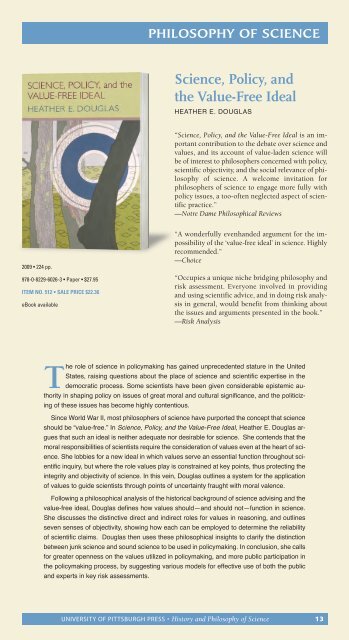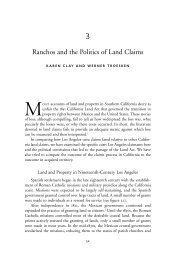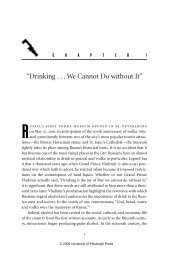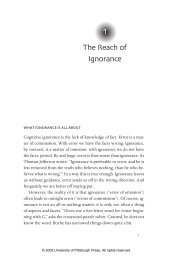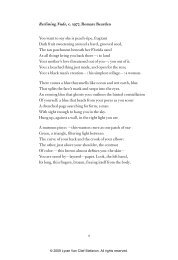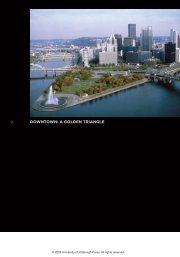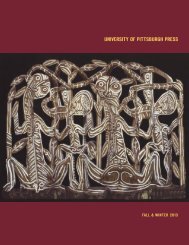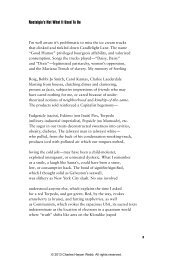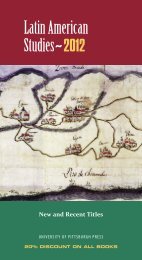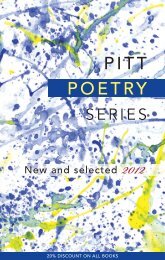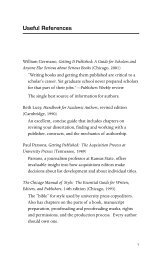History and Philosophy of Science - University of Pittsburgh Press
History and Philosophy of Science - University of Pittsburgh Press
History and Philosophy of Science - University of Pittsburgh Press
You also want an ePaper? Increase the reach of your titles
YUMPU automatically turns print PDFs into web optimized ePapers that Google loves.
2009 • 224 pp.<br />
978-0-8229-6026-3 • Paper • $27.95<br />
ITEM NO. 512 • SALE PRICE $22.36<br />
eBook available<br />
PHILOSOPHY OF SCIENCE<br />
<strong>Science</strong>, Policy, <strong>and</strong><br />
the Value-Free Ideal<br />
HeAtHer e. DouGlAS<br />
“<strong>Science</strong>, Policy, <strong>and</strong> the Value-Free Ideal is an important<br />
contribution to the debate over science <strong>and</strong><br />
values, <strong>and</strong> its account <strong>of</strong> value-laden science will<br />
be <strong>of</strong> interest to philosophers concerned with policy,<br />
scientific objectivity, <strong>and</strong> the social relevance <strong>of</strong> philosophy<br />
<strong>of</strong> science. A welcome invitation for<br />
philosophers <strong>of</strong> science to engage more fully with<br />
policy issues, a too-<strong>of</strong>ten neglected aspect <strong>of</strong> scientific<br />
practice.”<br />
—Notre Dame Philosophical Reviews<br />
“A wonderfully evenh<strong>and</strong>ed argument for the impossibility<br />
<strong>of</strong> the ‘value-free ideal’ in science. Highly<br />
recommended.”<br />
—Choice<br />
“Occupies a unique niche bridging philosophy <strong>and</strong><br />
risk assessment. Everyone involved in providing<br />
<strong>and</strong> using scientific advice, <strong>and</strong> in doing risk analysis<br />
in general, would benefit from thinking about<br />
the issues <strong>and</strong> arguments presented in the book.”<br />
—Risk Analysis<br />
The role <strong>of</strong> science in policymaking has gained unprecedented stature in the united<br />
States, raising questions about the place <strong>of</strong> science <strong>and</strong> scientific expertise in the<br />
democratic process. Some scientists have been given considerable epistemic authority<br />
in shaping policy on issues <strong>of</strong> great moral <strong>and</strong> cultural significance, <strong>and</strong> the politicizing<br />
<strong>of</strong> these issues has become highly contentious.<br />
Since World War II, most philosophers <strong>of</strong> science have purported the concept that science<br />
should be “value-free.” In <strong>Science</strong>, Policy, <strong>and</strong> the Value-Free Ideal, Heather e. Douglas argues<br />
that such an ideal is neither adequate nor desirable for science. She contends that the<br />
moral responsibilities <strong>of</strong> scientists require the consideration <strong>of</strong> values even at the heart <strong>of</strong> science.<br />
She lobbies for a new ideal in which values serve an essential function throughout scientific<br />
inquiry, but where the role values play is constrained at key points, thus protecting the<br />
integrity <strong>and</strong> objectivity <strong>of</strong> science. In this vein, Douglas outlines a system for the application<br />
<strong>of</strong> values to guide scientists through points <strong>of</strong> uncertainty fraught with moral valence.<br />
Following a philosophical analysis <strong>of</strong> the historical background <strong>of</strong> science advising <strong>and</strong> the<br />
value-free ideal, Douglas defines how values should—<strong>and</strong> should not—function in science.<br />
She discusses the distinctive direct <strong>and</strong> indirect roles for values in reasoning, <strong>and</strong> outlines<br />
seven senses <strong>of</strong> objectivity, showing how each can be employed to determine the reliability<br />
<strong>of</strong> scientific claims. Douglas then uses these philosophical insights to clarify the distinction<br />
between junk science <strong>and</strong> sound science to be used in policymaking. In conclusion, she calls<br />
for greater openness on the values utilized in policymaking, <strong>and</strong> more public participation in<br />
the policymaking process, by suggesting various models for effective use <strong>of</strong> both the public<br />
<strong>and</strong> experts in key risk assessments.<br />
UNIVERSITY OF PITTSBURGH PRESS • <strong>History</strong> <strong>and</strong> <strong>Philosophy</strong> <strong>of</strong> <strong>Science</strong> 13


